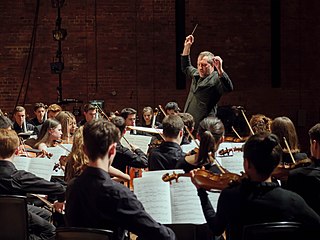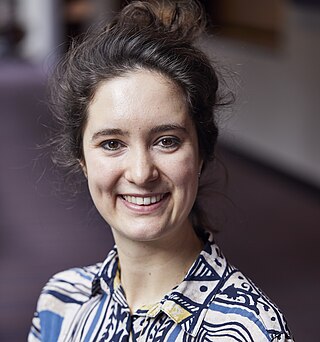Related Research Articles
Simon Proctor is a British composer and pianist, known for his works for unusual instruments.

Thomas Joseph Edmund Adès is a British composer, pianist and conductor. Five compositions by Adès received votes in the 2017 Classic Voice poll of the greatest works of art music since 2000: The Tempest (2004), Violin Concerto (2005), Tevot (2007), In Seven Days (2008), and Polaris (2010).
Philip Cashian is an English composer. He is the head of composition at the Royal Academy of Music.

Elena Olegovna Firsova is a Russian composer living in the UK.
Brian Elias is a British composer.
David Blake is an English composer and founder member of the Department of Music at the University of York.
Dan Welcher is an American composer, conductor, and music educator.
Cheryl Ann Frances-Hoad is a British composer.

Kenneth Hesketh is a British composer of contemporary classical music in numerous genres including dance, orchestral, chamber, vocal and solo. He has also composed music for wind and brass bands as well as seasonal music for choir.
David Horne is a Scottish composer, pianist, and teacher.
Huw Thomas Watkins is a British composer and pianist. Born in South Wales, he studied piano and composition at Chetham's School of Music in Manchester, where he received piano lessons from Peter Lawson. He then went on to read music at King's College, Cambridge, where he studied composition with Robin Holloway and Alexander Goehr, and completed an MMus in composition at the Royal College of Music, where he studied with Julian Anderson. Huw Watkins was awarded the Constant and Kit Lambert Junior Fellowship at the Royal College of Music, where he used to teach composition. He is currently Honorary Research Fellow at the Royal College of Music.
Raymond Yiu, born 1973; is a composer, conductor, jazz pianist and music writer.
Matthew Taylor is an English composer and conductor.
Rebecca Saunders is a London-born composer who lives and works freelance in Berlin. In a 2017 Classic Voice poll of the greatest works of art music since 2000, Saunders' compositions received the third highest total number of votes (30), surpassed only by the works of Georg Friedrich Haas (49) and Simon Steen-Andersen (35). In 2019, writers of The Guardian ranked Skin (2016) the 16th greatest work of art music since 2000, with Tom Service writing that "Saunders burrows into the interior world of the instruments, and inside the grain of Fraser's voice [...] and finds a revelatory world of heightened feeling."
Psappha was an ensemble of contemporary classical musicians based in Manchester in the North West of England, specialised in the performance of works by living composers. Founded in 1991 by artistic director Tim Williams, the ensemble moved into a new home in 2015, St Michael's, Ancoats, Manchester. The ensemble had a core instrumentation of flute, clarinet, piano, percussion, violin, viola and cello.
Geoffrey Richard Poole is a contemporary classical composer and educator. His scores range from Western orchestral, choral, vocal, chamber, theatre and contemporary dance genres, to intercultural conceptions featuring Ghanean Drummer, Javanese Gamelan, or Korean traditional performers.
Joseph Phibbs is an English composer of orchestral, choral and chamber music. He has also composed for theatre, both in the UK and Japan. Since 1998 he has written regularly to commissions for Festivals, for private sponsors, and for the BBC, which has broadcast premieres of his orchestral and chamber works from the Proms and elsewhere. His works have been given premieres in Europe, the United States and the Far East, and he has received prestigious awards, including most recently a British Composer Award, and a Library of Congress Serge Koussevitzky Music Foundation Award. Many of his works have been premiered by leading international musicians, including Dame Evelyn Glennie, Esa-Pekka Salonen, Leonard Slatkin, Sakari Oramo, Vasily Petrenko, Gianandrea Noseda, and the Belcea Quartet.

Julian Philips is a British composer. Philips' works have been performed at major music festivals, including The Proms, Tanglewood, Three Choirs Festival, at the Wigmore Hall, South Bank Centre and Berlin Philharmonic Chamber Music Hall and by international artists such as Gerald Finley, Dawn Upshaw, Sir Thomas Allen, the Vertavo String Quartet, the Tanglewood Festival Orchestra, the BBC orchestras and the Aurora Orchestra.

Lucy Armstrong is a British composer based in London, who was appointed Fellow of Composition at the Guildhall School of Music and Drama, London in 2018. She is currently doing a three year residency at Glydnebourne.
Grace-Evangeline Mason is a British composer of contemporary classical music.
References
- ↑ Biography, Edition Peters
- ↑ Clive Williamson, Philip Grange Tempo, New Ser., No. 146 (Sep., 1983), pp. 25-30 JSTOR 944973
- ↑ "Prof. Philip Grange". School of Arts, Histories and Cultures, University of Manchester.
- ↑ BBC Proms performance archive
- ↑ Camden Reeves, Music as Transition a : An Interview with Philip Grange, Tempo (2006), 60: 15-22 doi : 10.1017/S0040298206000295
- ↑ University of Manchester, research portal
- ↑ Edition Peters
- ↑ Cloud Atlas, full score, Edition Peters, page 4
- ↑ MusicWeb review
- ↑ Youtube
- ↑ Maecenas Music
- ↑ Worklist, Edition Peters, 2014
